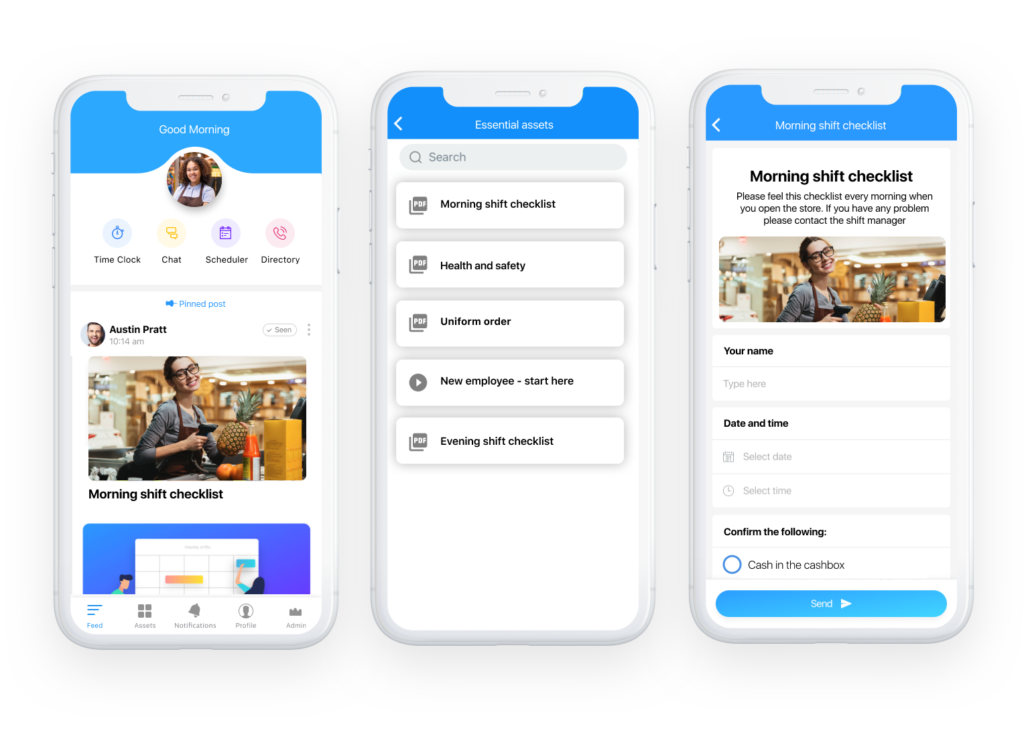Starting your own business isn’t easy, especially starting a retail business. That’s why we rolled up our sleeves to share the 10 steps you must take to ensure success when you open your doors.
Starting a retail business just isn’t the same as it used to be. These days, merely having a good product and developing a good rapport with customers isn’t enough.
There are so many details that go into starting a retail business beyond what people see on the surface. Even if you have the experience and know how to start a retail business, it never hurts to get a little outside advice.
After all, running a business often requires getting as much help as you can get.
To paint with a broad brush, getting a successful retail business off the ground requires a lot of attention to detail. Even after you get it started, owning, operating, and managing a retail business is no easy task.
Never forget that there are little intricacies that might apply in retail but not in other industries. With that in mind, we’d like to share ten tips for starting a retail business and finding success in this industry.
Start With A Plan
No matter the industry, it’s hard to start any business without a proper business plan. It’s particularly important if you don’t know how to start a retail business.
An official business plan is where you lay out all of the details about your business. It requires a lot of thought and research, but in the end, it provides you with an excellent blueprint for starting a retail business of your own.
- In your plan, you’ll lay out what you want to sell
- The type of customer you want to target
- The competition you’ll face
- What will make you stand out in the market
- How much you’ll charge
- And countless other questions related to your business.
It’s almost impossible to succeed in retail if you don’t know the answers to these questions ahead of time. After all, nobody succeeds in this industry by dumb luck. You have to be prepared ahead of time, and your business plan will help you find answers to almost any question you’ll need to answer along the way.
Find The Right Suppliers
Unless you plan on making everything you sell from scratch, you’ll need to find the right suppliers to help get your business off the ground. Even if you are making everything by hand, you’ll still need suppliers for the raw materials, so there’s no getting around this step. The problem is that relationships with suppliers can take a long time to solidify.
In the beginning, it’s sometimes best for new businesses to use several suppliers. That way, you don’t get tied to one who isn’t a good fit. Plus, if you use multiple suppliers, you might be able to negotiate a better deal with a supplier that wants you to be exclusive.
Don’t Forget The Legalese
Unfortunately, not every part of running a business is fun and games. A lot goes into starting a retail business that has nothing to do with your product, customers, or anything in your business plan, e.g., rules and regulations that you need to follow, permits to acquire, and insurance to purchase. If you aren’t sure how to start a business or have previous experience in this space, this is where it’s good to seek assistance from a lawyer, a peer, or someone at your local Chamber of Commerce. If you forget something that you need, it could get in the way of getting your business off the ground.
Set Realistic Goals
An overrated part of any successful business is having clear goals and objectives in place. It’s okay to have lofty goals for the distant future when you’re the most successful business ever created. But short-term and mid-range goals are equally important. It’s best to set goals that aren’t too easy to achieve yet aren’t completely out of reach.
Think back to your business plan and determine a reasonable amount of traction for your business to gain in the first six, 12, or 24 months. Obviously, you want to reach the goals you set, but if you don’t, treat it as a learning experience that lets you know that something isn’t working quite right.
Look And Location
In the retail space, location and appearances are everything. You need to find the right location to put your business and attract customers while also giving your shop an attractive appearance that will draw people inside. Both the inside and outside of your store need to feel inviting; otherwise, people won’t want to go inside and spend time there. Having your store in a nice location and making it look inviting is almost as important when starting a retail business as the products you’re selling. Think of these as the first steps in building your brand.

Check out our guide on how to get people, more foot traffic, into your store!
Embrace What Makes You Unique
Part of creating a successful business in any industry is finding the gap in the market.
In other words, what makes your business different and stand out from the competition? How do you offer a unique type of product or experience to your customers?
It doesn’t have to be a big difference, but there has to be something.
Find what makes your business individual and emphasize that as much as possible. If you just try to emulate another business, you’ll never catch up to their success. You need to differentiate your business from the competition by embracing the thing that makes you unique.
Hire The Right Team
Remember when we said that starting a retail business will require a lot of help? Well, a big part of that help is finding the right team to work for you.
As the owner of a new business, you have a chance to establish the culture and find employees who fit in, as well as follow the path you lead. Ask behavioral questions during the interview to further gauge candidates.
Think of employees as representatives for your business. Whether or not they have experience working in retail, you need to determine if they have the qualities you want in employees. If they don’t fit the culture or follow the guidelines you’ve set for them, having previous experience isn’t worth a lot. This is why hiring the right people to support your efforts is a critical part of starting a new business.
And don’t forget to create an efficient training process once they get started.
Additionally, make sure you’re the best retail manager you can be to help your staff be the best they can be too. After all, employee engagement in retail is essential to lowering turnover and keeping customers happy.
Create An Online Presence
Even if you are starting a brick-and-mortar retail store, an online presence is required for success in today’s world. A lot of potential customers will want to learn more about a business online before visiting. It’s important to have a website for your business, as well as a strong social media presence. It’s not as complicated as it sounds, but it needs to be done or you’ll risk losing out on business.
In fact, 55% of consumers have purchased something they discovered on social media and 81% of shoppers do online research before committing to a purchase. Try to put as much information about your business as possible on the Internet. The more customers know about your business and understand what you bring to the table, the more likely they will be to give you their business.
And if you’re running multiple locations, be sure to read up how to successfully manage multiple retail stores.
Look For Partnerships
While partnerships might seem a little advanced for a new business, that’s not always the case. Look for creative ways that your business and other small businesses can help each other out – after all, 98% of retail is made up of small businesses.
Obviously, you may not want to do this with direct competitors. But there might be a way to collaborate with a different type of business to help one another expand your customer base. You may not find the perfect partner, but it’s worth exploring your options if it’ll help get your name out there.
Choose The Right Business Tools
If you’re unsure how to start a retail business, the biggest key is finding the tools to help. There are countless forms of software and other tools that can make life easier for business owners.
This can include a POS system, accounting software, scheduling software, marketing tools, and even e-commerce assistance.
To bring things full circle, you will surely need all of the help you can get when starting a retail business. A part of this is finding the business tools that can help you run things smoothly. Like an all-in-one retail app that’s available on the go, right on your own mobile phone!
And leading the market is Connecteam. It allows for:
- Real-time communication with employees helps improve retention and engagement
- Accurate GPS time tracking and payroll management (Connecteam’s integration with QuickBooks Online and Gusto ensures payroll is 100% accurate and quick).
- Efficient scheduling per shift and employee roles
- A digital library for all training and know-how material like the employee handbook, how to set up a display, operating the POS, and more
- Automating daily processes and tasks like open/close checklist, inspection form, incident report, etc.
- And more!
Not only is Connecteam easy to use and super affordable, but it offers a whole slew of features that make the above so easy.

- 1:1 or group chat
- Live polls, surveys, and a suggestion box
- A social feed with like and comment capabilities
- Add GIFs, videos, pictures, etc.
- Export timesheet data
- Templates, recurring shifts, open shifts, etc.
- In-app directory
- Task management
- Quizzes
It doesn’t stop there though. When it comes to starting a retail business and then running it day by day as efficiently as possible, Connecteam is your right hand man every step of the way.
Scale Your Retail Business With Connecteam
Free to start, no CC required!
Final Note On Starting A Retail Business
Navigating opening a retail business is no easy feat. With countless formation steps you must consider and plenty of rules and regulations to follow, it can be easy to lose track of why you’re starting a retail business in the first place.
But, if you ignite the passion that drove you to want to open a retail business, you may even enjoy putting together the business plan and working out the intricacies of the process. So, don’t forget before the grand opening, narrow down your target market, decide what you’re selling, secure a location, and tick off all legal requirements – and before you know it, you’ll be open for business. (Don’t forget to read up on how to reduce shrinkage!)
And when your retail business is off and running, remember to utilize all-in-one retail apps and other necessary technology to keep your business running smoothly.
Efficiently Run Your Retail Business With Connecteam
A full suite of features to get the job done!




